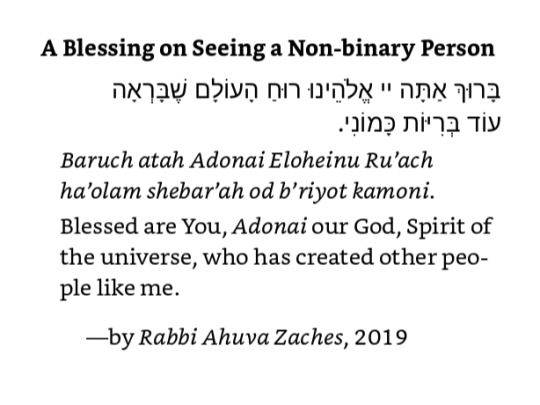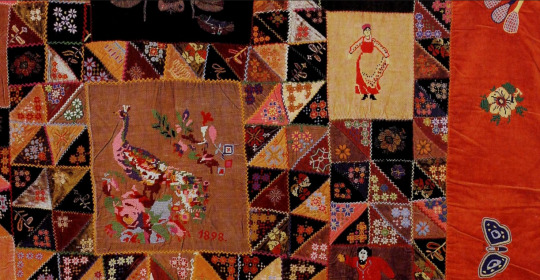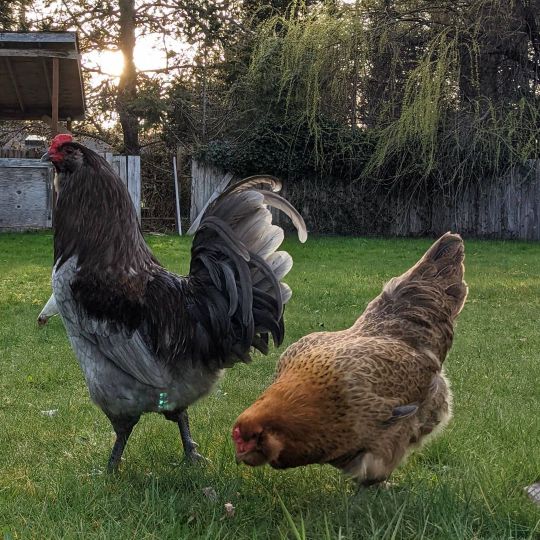Text
I asked you to pray in the synagogue of your city
but if you cannot pray in the synagogue,
pray outdoors in an open field;
and if you cannot pray in the field,
pray in the shelter of your home;
and if you cannot pray in your home,
pray in the dark on your bed;
and if you cannot pray on your bed,
meditate in your heart without words.
– Based on Midrash T’hilim on Psalm 4:9.
589 notes
·
View notes
Text

mishkan ga'avah: where pride dwells, edited by rabbi denise l. eger
17K notes
·
View notes
Text
An Introduction to Kashrut & Kosher Eating

i. "Kashrut" and "Kosher"?
ii. Kashrut Specifics
iii. Modified Ways to Keep Kosher
iv. Resources
border inspo & header art

You may already be confused about what these words even mean, and that's totally okay, we're all here to learn. The following are some important terms to keep in mind:
Halakha : Jewish Law as outlined within the Talmud. It governs everything from punishment for crimes to sex to defining "what" Judaism is. It is more of a way of life than a set of laws.
Kashrut : A subsection of Halakha, specifically referring to regulations surrounding food and everything to do with it.
Kosher : An adjective used to refer to food or food-related products (like forks and spoons) that are deemed okay for Jews to eat/use by Kashrut. "Keeping Kosher" refers to eating according to Kashrut.
Kashering : To cause something to become kosher.
Treif : Everything that is non-Kosher.
Pareve : Food that is "neutral", neither meat nor dairy. This includes fruits, vegetables, grains, eggs, and sometimes fish.
Kashrut tells us what animals are safe to eat, how these animals should be slaughtered, what food can and can't be mixed, alongside instructions on how to use the tools made for preparing/eating food. There's a lot more to Kashrut (which I'll go into soon), but those are the basic ideas. Kashrut includes many guidelines that we see as common sense (such as not eating diseased meat) to everyday cleanliness (checking that fruits and veggies are free of bugs) to things that some people would think are "weird" (like not eating shrimp).
Of course, much of Kashrut is highly cultural in nature, and was largely shaped by Jewish cultural ideas of cleanliness and commonly eaten foods. For example, bugs are a normal food in many countries/cultures, but they are not Kosher, as Israelite culture never included bugs in its food. This is why many Jews who are also parts of cultures to whom treif foods are significant experience a lot of inner conflictions about keeping Kosher. Instances like the one mentioned before, alongside a countless amount of others, are why there are different levels of keeping Kosher, which I will expand on soon.
Many people ask me why I eat Kosher in the first place. Reactions range anywhere from "Oh wow, I could never give up bacon!" to "Ugh, why follow such archaic laws?" when people find out.
But really, why do we? Is it because it would cause severe health issues if we ate shellfish or a ham and cheese sandwich? No, obviously not. While some of the prohibitions in Kashrut may have health benefits, such as avoiding certain diseases or infections, the primary reason for observing these laws is not based on health concerns. In fact, Halakha dictates that we should not eat Kosher if it would threaten our health or lives in any way. We live by the laws, we don't die by them.
Interestingly enough (right back at ya, "archaic laws" person), it's because they are archaic. It is not because anyone who eats pork is disgusting or wrong or bad in any way. It's our culture, our tradition, it's been passed down absolutely forever. It's a marker and a reminder of who and what we are, a way to celebrate Jewishness. It's also a ritual, a daily form of active mediation and prayer to bring us closer (and remind us of) HaShem.
Eating Kosher is not just about what we eat, but also about how we eat. It's a daily ritual that involves mindfulness, intentionality, and gratitude. It's a way to incorporate our culture and religion into our every day, never forgetting who we are. By following these ancient guidelines, we affirm our connection to a long and rich history, to a community that has survived and thrived through centuries of persecution and adversity.
We embrace a way of life that is not driven by the latest trends or fads, but rather by timeless values and principles that have stood the test of time. When we follow the laws of Kashrut, we are reminded of our connection to HaShem, the sanctity of our traditions, and the importance of our community. We engage in active meditation and prayer, bringing us closer to HaShem and to each other.

Alright, now it's time to get into the exact specifics of what Kashrut outlines for us. It is usually Orthodox Jews who follow every single one of the rules, Conservative Jews follow all or most of these rules, and Reform Jews tend to not keep kosher. Of course, this doesn't speak for all denominations or even every Jew in each of the denoms I mentioned, but those are the most common "levels" of keeping kosher among Jews. Keeping kosher is hard, and not everyone has the time, resources, etc. to follow Kashrut as closely as they'd like, which is why different people choose what's right for them.
In this section, I'll cover the exact guidelines in Kashrut, exceptions to keeping kosher, and some modern interpretations of kosher expectations.

— Anything produced by forbidden animals- like their eggs and milk- is prohibited.
— Land mammals should have cloven hooves and chew their cud.
• In Leviticus 11:3 and Deuteronomy 14:6
• Cloven hooves: Hooves split into two "toes".
• Chewing cud: The process of chewing, partially digesting, regurgitating, and re-chewing food.
• Permitted land mammals include oxen, goats, sheep, and deer.
• Forbidden land mammals include pigs, horses, rabbits, and camels.
— Marine life must have fins and scales.
• In Leviticus 11:9 and Deuteronomy 14:9
• Permitted marine life includes salmon, tuna, and carp.
• Forbidden marine life includes shrimp, lobster, and scallops.
— Birds must not be scavengers or birds of prey.
• In Leviticus 11:13-19 and Deuteronomy 14:11-18
• Only specific birds are prohibited, not types of birds. Rabbis have decided to forbid the categories the listed birds fall into (scavengers and birds of prey).
• Permitted birds include chicken, geese, ducks, and turkeys.
• Forbidden birds include eagles, vultures, ravens, and owls.
— Winged insects are… complicated.
• In Leviticus 11:22
• Some winged insects used to be permitted, but we no longer know which ones those are, so all winged insects are decidedly forbidden.
— Other miscellaneous animals are forbidden.
• In Leviticus 11:29-30, 42-43
• Rodents (mice, squirrels, rats)
• Wingless insects (centipedes, silverfish, lice)
• Amphibians (frogs, toads, salamanders)
• Reptiles (snakes, lizards, turtles)
— Certain parts of kosher animals are forbidden to eat.
• All blood from the meat of land mammals and birds must be drained out during slaughter and then salted/broiled out because blood is their life force and should be respected (Leviticus 7:26-27; 17:10-14).
• Fat found on on the internal organs and below the eleventh rib (Leviticus 3:9; 7:23).
• The sciatic nerve (of the lower leg) to commemorate Jacob’s victory over an angel after they wrestled all night, during which the angel dislodged Jacob’s sciatic nerve (Genesis 32:22).
— Animals must be slaughtered in a particular way.
• In Deuteronomy 12:21; 14:21 and Numbers 11:22.
• These rules pertain to land mammals and birds, but not fish.
• Animals cannot have died due to natural causes or another animal killing them.
• Meat should not be diseased or flawed in any way.
• Animals must be slaughtered by having their throat slit quickly and in one strong slash. This way, the most blood drains out and the animal is slaughtered in the most humane way.

— Meat and dairy cannot mix (Exodus 23:19; 34:26 and Deuteronomy 14:21).
— Foods which are neither meat nor dairy are pareve, and can be used freely with both meat and dairy.
• Commonly, fish is counted as pareve, but some traditions (usually Sephardic) prohibit the mixing of fish with meat.
— A certain amount of time should pass between the consumption of meat and dairy.
• Traditionally, one waits 3-6 hours after eating meat to consume dairy, but only 1-3 hours after eating dairy to eat meat.
• Some traditions include that one must wait only an hour after dairy, except for hard cheeses, after which they must wait 3 hours.
— Different utensils and equipment must be used for meat and dairy. This includes everything from the tools used for slaughter to the plates in your home.
• Utensils have a label just like food (meat, dairy, pareve, or treif) which affects the status of the food which comes in contact with it, but only in the presence of heat.
• For example, a fork will become treif if it touched shrimp, and if it touches any hot kosher food (or if the fork or shrimp is hot), the food also becomes treif. This affects things like dishwashers (in which both meat and dairy utensils come in contact with heat in the same space), sinks (which can be hot), and towels (when used to transport hot pots).
• It is totally fine to do something like use a knife with both meat and dairy, as long as both the knife and food is cold, and as long as the knife is cleaned between foods.

— All fruits and vegetables are kosher.
• In Genesis 1:29
• Fruits and vegetables must be thoroughly washed and checked for bugs.
• Fruits and vegetables cannot come in contact with any products which include insects, like some dyes and additives.
— Grape products cannot be made by idolators.
• This began because of wine's ritual importance, and Jews did not want to consume wine that was made to use in the worship of idols.
• This usually only refers to wine or grape juice.
• More recently, because the creation of wine is now automated, it is technically not made by idolators and has been seen as kosher to some denominations (usually Conservative Jews).

We've gone through the different rules and regulations of Kashrut, which include that utensils/towels can become treif. But what happens if you accidentally eat treif? If utensils become treif, do they need to be thrown out?
— Accidentally (or knowingly) eating treif.
• The remedy for this is simply to feel bad and do better in the future.
• But, if you feel particularly bad, you can do a good thing so that the bad thing (eating treif) leads to a good thing, and therefore the entire mistake becomes positive. Good things can include tzedakah, charitable giving (like donating money/old clothes, volunteering, etc.).
— Kashering utensils, equipment, etc.
• Kashering is done both when something is first bought and if it ever becomes trief. Usually, only new cooking equipment is kashered (like by being dipped into a mikveh, a pool of holy water), and not everything you buy.
• To "reset" utensils/equipment after it has become treif, it can be dipped in a mikveh, or things like towels can be kashered simply but putting them in the laundry.
• Everyone will have different ways to kasher and different intensities of kashering.
— Treif food being the only option.
• During medical emergencies (like a blood sugar crash) or similar situations, it is not a sin to eat treif. Human life is put above all else within Judaism, meaning that everything will be rendered not a sin if breaking it is necessary to save a life (which is also why abortion is required even in the most Orthodox communities).

Keeping kosher is hard. There's a ton of rules and things which build upon each other. It's a lot to remember. Considering that many households separate meat and dairy to the point of having separate sinks and refrigerators, most people just don't have the resources to keep kosher in that way.
If you're low on spoons, disabled, or neurodivergent, those factors can make keeping kosher even more difficult. I'm a spoonie with ADHD and Autism, so I'm chronically fatigued, and have ARFID that contributes to multiple food-related issues.
You should always remember that you are not required to keep kosher if it interferes with medical needs (like I listed), and so you should never feel bad about how "well" you keep kosher. That being said, let's move onto some tips for modified kosher eating.
Try only keeping kosher on shabbat and/or important holidays.
Sometimes, our safe foods or the only food we have access to are treif. However, you're usually already listening to 99% of Kashrut prohibitions on which animals you can eat (like avoiding bugs, reptilians, rodents, scavengers, etc.). So that's already a big step!
Instead of having completely separate equipment for meat/dairy, simply wash your utensils between using them for meat/dairy.
Instead of waiting up to 6 hours between eating meat and dairy, wait 1 hour, drink water between the two foods, and/or create a distinct separation in time between consuming the foods (like getting up to go do something, stopping to talk, etc.).
When it comes to washing utensils, try and separate them by putting them on different washing machine racks, run the washing machine between using it for meat/dairy utensils, or rinse off the inside of the sink between hand-washing meat/dairy utensils.
Use disposable plates/cups/utensils to separate meat and dairy.
Buy only kosher meat, or only kosher foods (most foods in everyday grocery stores will be kosher).
If you're vegan, and depending on the type of vegetarian, you're already eating kosher!

You've finally reached the end of this post, and I hope it was helpful to you. Below, I will list multiple sources for further reading, help in keeping kosher, and just some cool questions about being kosher ("is meat from a cloned animal kosher?").
An extensive course on the laws of Kashrut taught by Rabbis
"Bagels: A Surprising Jewish History" by Dr. Yvette Alt Miller
"Does G-d Really Care?" from Kosher Certification
"I Keep Kosher. My Parents Did, Now Don't. It's Complicated." by Talia Kaplan
"Is Lab-Grown Meat Kosher?" by Yehuda Shurpin
"Issues in Jewish Ethics: The Ethics of [Kosher] Cloning" by Dr. Daniel Eisenberg, M.D.
"Jews in America: The Kosher Meat Boycott of 1902" by Dr. Michael Feldberg
"Kashrut Laws as Written in Torah" from the Jewish Museum in London
"Kashrut: the Jewish Dietary Laws [from Biblical, Rabbinic, and Modern Perspectives]" by Jonathan Magonet
"Marijuana Is Always Kosher, as Long as You Smoke It" by Ruth Schuster
"OU Kosher Grocery Store Symbols Explained" by Rabbi Chaim Goldberg
"People Eat Treyf for Their Own Reasons. They All Think About Their Judaism." by Jonathan Katz
"Saying Goodbye to Bacon" by Liel Leibovtiz
"Ten Reasons to Keep Kosher (And They’re Not What You Think)" by Rabbi Alec Goldstein
"The Jewish Dietary Laws: Their Meaning for our Time and a Guide to Observance" by Samuel H. Dresner and Seymour Siegel
"What Archaeology Tells Us About the Ancient History of Eating Kosher" by Lina Zeldovich
"What Is Kosher for Passover?" from Chabad.org
"Why I Don’t Keep Kosher" by Rabbi Jillian Cameron
"Why I Stopped Freaking Out About Other People’s Kosher Habits" by Erris Langer Klapper
"Why Keep Kosher?: Jewish dietary practices allow us to welcome the sacred into our daily lives and into mundane acts." by Rabbi Dr. Bradley Shavit Artson
"5 Misconceptions About Keeping Kosher" by Mandy Hakimi

431 notes
·
View notes
Text
An idea for a trans positive bracha for transition:
ברוך אתה האשם שגרם לי להשתתף בבריאה
Blessed are you, Hashem, who made me to participate in creation
358 notes
·
View notes
Note
You do realize that the more you keep bitching about atheists using the term “sky daddy” the more we’re gonna use it, right? It’s an insult so the fact that you hate means it’s doing its job. You’ll never stop us from calling god “sky daddy”. And quite frankly I don’t know why even care so much? What difference does it make what a bunch of atheists call something we don’t even believe in?? And how is it even remotely your business what we call god anyway?
For someone who apparently doesn't care, you cared enough to send me random anon hate for a post I made a year ago and haven't spoken about since.
I'm allowed to have an issue with the way you refer to God. I'm allowed to think it's cringy, weak, closed-minded, immature, and loser-ish. And I'm allowed to say as much 🤷🏻♀️ It's not offensive to me, I just think you're embarrassing. I see people who use it like a walking red flag, because in my experience people who use that term are usually militant culturally Christian atheists who have no understanding of the fact that Judaism is different from the Christianity they were raised with. So when they interact with a religious Jew, they can't be normal and have to trauma dump about their experiences with Christianity, or have a holier-than-thou attitude about religious people that can turn into antisemitism pretty fast.
And I know you're probably one of those atheists that hates being called culturally christian, so I hate to break it to you but the concept of a "sky daddy" is a Christian one.
524 notes
·
View notes
Text
LGBTQ+ Jewish Resources and Organizations
Happy Pride! Here's a few links I've collected to hopefully reach whoever in the Jewish community may need them. If you're considering donating a bit of money or volunteer time this Pride, please consider looking into these efforts (at your own discretion, as many of these may be local to specific areas).
Please feel free to add on to this list, and any queer Jews reading are welcome to link their personal donation posts in the comments.
The SMQN, an organization for LGBTQ+ Sephardic and Mizrahi Jews
Keshet, a group for LGBTQ+ Jews
JQY, a group for LGBTQ+ Jews with a focus on those in Orthodox communities
Queer Jews of Color Resource List (note: this list is way more than just resources, there’s a LOT of helpful stuff in here)
JQ International: In their own words, "JQ celebrates the lives of LGBTQ+ Jews and their allies by transforming Jewish communities and ensuring inclusion through community building, educational programs, and support and wellness services, promoting the healthy integration of LGBTQ+ and Jewish identities."
Ritualwell (check out their blessings related to gender identity!)
Guimel, an LGBTQ+ support group for the Jewish Community in Mexico. The site is in Spanish. I’m not a native speaker, but I was still able to read a little bit of it.
SVARA: In their own words, “SVARA’s mission is to empower queer and trans people to expand Torah and tradition through the spiritual practice of Talmud study.”
TransTorah is definitely an older website, but there are still some miscellaneous pdfs and resources up on the “Resources” page.
SOJOURN: In their own words, "The Southern Jewish Resource Network for Gender & Sexual Diversity (SOJOURN) is the American South's resource for Jewish & LGBTQ+ programming, education, support, and advocacy."
715 notes
·
View notes
Text
"Of the Book"
1.
G-d tells Moses:
there will be times
when the people will stray from Me
and I, too, then,
will turn from the people.
Write this truth down,
a testimony
to the people for all time.
And Moses writes this warning into a book.
2.
So that when the people do not turn to G-d
and G-d does not turn to the people
this writing,
this book
still speaks between them.
3.
Through this book, perhaps,
we will find our way back to each other.
(Deuteronomy 31:15-30)
- Abe Mezrich, “Between the Mountain and the Land is the Lesson”
213 notes
·
View notes
Text
A Freyylikhn Sukkes!
And Chag Sukkot Sameyach!


96 notes
·
View notes
Text
transsexualism is a reflection and honoring of G-d’s holy act of creation. as we thank G-d for the grapes we ferment and crush to create our wine, as we thank G-d for the wheat we grind and transform to create our bread, of course we thank G-d for the blood and soul with which we create ourselves.
378 notes
·
View notes
Text
When life gives you lemons, shake them
412 notes
·
View notes
Text

Story time:
My friend build a beautiful sukkah from scrap and spare parts in this gorgeous community archaist space full of garden plots and native plants.
Completely organically about a dozen of us arrived at the sukkah together, each of us had invited a few people, but we all bonded and squeezed together under the grape vines and stars.
We shared food and all introduced ourselves. The creator of the sukkah made make shift latterns we held up to see others faces.
We made an indigenous lulav to represent our area’s ecosystems. We passed it around, shared prayers and took turns shaking it. We left it at the sukkah for anyone else who happened to stop by.
It was everything I imagine when I celebrate shtetlcore.
34 notes
·
View notes
Text
Hi everybody! Here's a slower version of the Sukkah video. I hope this is easier to keep up with. Sorry, now you get to watch me make motzi in slow motion. :p
214 notes
·
View notes
Photo


Quilt, velvet embroidered with wool, silk, and metallic threads, glass beads, Russian and the United States, 1898.
From Masterworks of the Jewish Museum.
4K notes
·
View notes





